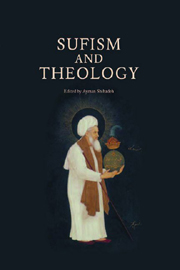Book contents
- Frontmatter
- Contents
- Contributors
- Acknowledgements
- Introduction
- Part I Mystical Theologies
- 1 Mystical Theology and the Traditionalist Hermeneutics of Maybudī's Kashf al-Asrār
- 2 The All-Comprehensive Circle (al-Iḥāṭa): Soul, Intellect, and the Oneness of Existence in the Doctrine of Ibn Sab'īn
- 3 One Aspect of the Akbarian Turn in Shī'ī Theology
- 4 Sufism and Theology in the Confessions of Ṣā'in al-Dīn Turka Iṣfahānī (d. 830/1437)
- 5 A Sufi Theology Fit for a Shī'ī King: The Gawhar-i Murād of 'Abd al-Razzāq Lāhījī (d. 1072/1661–2)
- Part II Theological Approaches to Sufism
- Index
5 - A Sufi Theology Fit for a Shī'ī King: The Gawhar-i Murād of 'Abd al-Razzāq Lāhījī (d. 1072/1661–2)
from Part I - Mystical Theologies
Published online by Cambridge University Press: 12 September 2012
- Frontmatter
- Contents
- Contributors
- Acknowledgements
- Introduction
- Part I Mystical Theologies
- 1 Mystical Theology and the Traditionalist Hermeneutics of Maybudī's Kashf al-Asrār
- 2 The All-Comprehensive Circle (al-Iḥāṭa): Soul, Intellect, and the Oneness of Existence in the Doctrine of Ibn Sab'īn
- 3 One Aspect of the Akbarian Turn in Shī'ī Theology
- 4 Sufism and Theology in the Confessions of Ṣā'in al-Dīn Turka Iṣfahānī (d. 830/1437)
- 5 A Sufi Theology Fit for a Shī'ī King: The Gawhar-i Murād of 'Abd al-Razzāq Lāhījī (d. 1072/1661–2)
- Part II Theological Approaches to Sufism
- Index
Summary
The origins of the Safavid dynasty as a Sufi order pose a basic paradox for our understanding of the religious history of early modern Iran. The shift from a charismatic, devotional leadership to monarchy, from pīr to shāh, meant that the rulers recognised the conflicts between temporal and spiritual authority and hence organised a vehement persecution of Sufi orders in Iran. However, this did not mean that devotion to the Shah could not be expressed in traditional Sufi formulae nor that aspects of Sufi thought and practice were proscribed in the Safavid period as antithetical to the emergent influence of Twelver Shī'ī jurists. There was no essential conflict between eros and nomos.
This chapter examines the Sufi theology of one particular seventeenth-century thinker who lived in an age when philosophy and mysticism were in vogue despite the protestations of some jurists, and analyses aspects of his major work, a summary of philosophical theology with a strong mystical inclination that was commissioned by Shah 'Abbās II (r. 1642–67) himself and dedicated to him. The text is not just a promotion of Sufi thought at court but also an implicit plea for patronage from a scholar who was out of favour. One needs to recognise that discourses about the permissibility of disciplines at court cannot be divorced from their social and political contexts.
- Type
- Chapter
- Information
- Sufism and Theology , pp. 83 - 98Publisher: Edinburgh University PressPrint publication year: 2007

